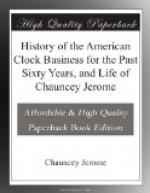I had always told my young men over there to put a fair price on the clocks, which they did; but the officers thought they put them altogether too low, so they made up their minds that they would take a lot, and seized one ship-load, thinking we would put the prices of the next cargo at higher rates. They paid the cash for this cargo, which made a good sale for us. A few days after, another invoice arrived which our folks entered at the same prices as before; but they were again taken by the officers paying us cash and ten per cent. in addition, which was very satisfactory to us. On the arrival of the third lot, they began to think they had better let the Yankees sell their own goods and passed them through unmolested, and came to the conclusion that we could make clocks much better and cheaper than their own people. Their performance has been considered a first-rate joke to say the least. There will, in all probability, be millions of clocks sold in that country, and we are the people who will furnish all Europe with all their common cheap ones as time lasts.
All of the spring and eight day clocks have grown out of the one day weight clock. There can now be as good an eight day clock bought for three or four dollars, as could be had for eighteen or twenty dollars before I got up the one day clock. Mr. Peck, who went to England with my son, died in London on the 20th, September, 1857; my son died in this country in July, 1853: so they have gone the way of all the earth, and I shall have to follow them soon. They were instrumental in laying the foundation of a large and prosperous business which is now being successfully carried on. The duties on clocks to England have been recently removed, which will result to the advantage of persons now in the business. The many difficulties which we had to battle and contend with are all overcome. When I invented this one day brass clock, I for the first time put on the zinc dial which is now universally used, and is a great improvement on the wood dial, both in appearance and in cost. This simple idea has been of immense value to all clock-makers.
In the year 1821, when I moved to Bristol, no one was making clocks in that town; the business had all passed away from there and was carried on in Plymouth. The little shop I had put up had no machinery in it at that time. I soon began to make so many cases that I wanted some better way to get my veneers than to saw them by hand. I found a small building on a stream some distance from my shop which I secured, with the privilege of putting a circular saw in the upper part, but which I could not use till night—the power being wanted for the other machinery during the day. I have worked there a great many nights till twelve o’clock and even two in the morning, sawing veneers for my men to use the next day. I sawed my hand nearly off one night when alone at this old mill, and was so faint by the loss of blood that I could hardly reach home. I always worked




